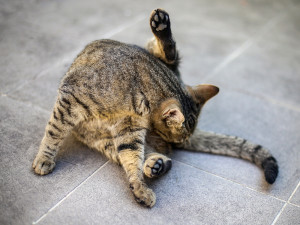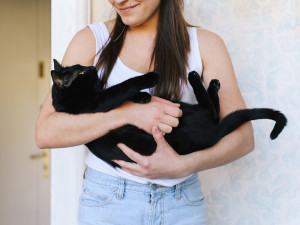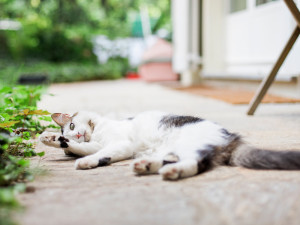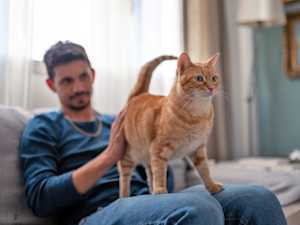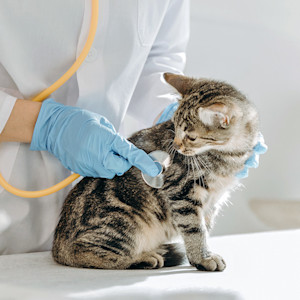My Cat’s Butt is Bleeding. What Should I Do?
Seems like an emergency. Is it?

Share Article
In This Article:
Is it an Emergency?opens in a new tab Rectal Bleeding in Catsopens in a new tab What Caused Your Cat’s Butt to Bleed?opens in a new tab What to Do If Your Cat is Bleeding from their Buttopens in a new tab Can You Prevent Your Cat’s Butt from Bleeding?opens in a new tab Frequently Asked Questionsopens in a new tab
My experience practicing emergency medicine has taught me that one of the things that makes pet parents panic most is seeing blood coming out of their pet’s rectum. And I agree, it’s a concerning sight. While some causes may be relatively minor, others can indicate serious health issues. Seek veterinary advice if you notice blood coming from your cat’s butt.

Save on the litter with color-changing tech that helps you better care for your cat.
Is it an emergency?
Not every case of rectal bleeding in cats is an emergency, but blood from your cat’s butt should never be ignored. Rectal bleeding can indicate that a mild to moderate problem (like gastroenteritis) is becoming more severe. It can also be the first sign of a serious systemic disease like blood clotting issues or cancer.
If your cat has been having diarrhea that now has a little blood streaking, it's probably OK to wait to see your vet tomorrow, assuming your cat is normal otherwise. If you’re not sure if your cat is having an emergency, I suggest contacting a veterinary clinic for advice.
Signs that you should have your cat evaluated ASAP for rectal bleeding include:
Heavy bleeding
Recent trauma
Known or suspected toxicity (especially rat bait)
Open wounds
Lethargy
Weakness
Vomiting
Bruising
Pale gums
Rectal bleeding in cats
If you spot blood in the litter box, on your cat’s bedding, or even smeared on the floor after your cat scoots, a quick investigation can help identify where the blood is coming from. First, I’ll give you a quick review of this portion of your cat’s anatomy, which includes the rectum, anus, anal glands, and perineum.
The rectum is the final portion of the large intestines; it’s where stool is held before a bowel movement. The anus is the opening that the stool passes through during a bowel movement. The anal glandsopens in a new tab are tiny sacs that are located at the four and eight o’clock positions next to the rectum. Lastly, the perineum is the area between the anus and the genitals.
So, if you spot blood, start by examining the stool for blood. Is there a streak of blood or is the stool itself bloody? A streak may be a sign of bleeding from the rectum or anus. Inspect under your cat’s tail for cuts, puncture wounds, or other signs of injury. Look at the anus and the area of the anal glands for lumps, redness, or swelling. Check for foreign material coming out of the anus — but don’t pull it! Instead take your cat to the vet for care.
Is it common for cats to bleed from their butt?
Rectal bleeding in cats is not normal and is relatively uncommon, but it can occur secondary to commonly diagnosed issues such as injury, anal gland issues, parasites, or intestinal disease.
What caused your cat’s butt to bleed?
Anal sac disease
Cat anal sacsopens in a new tab (often called anal glands) produce a thick, fishy-smelling fluid that is usually pushed out during bowel movements. However, if the fluid doesn’t come out on its own, the anal sacs can become full, impacted, infected, or abscessed. Treatment typically involves expressing full anal glands. If infection is present, antibiotics and abscess care may be needed.
Constipation
Constipated cats will spend a lot of time straining to pass what is often dry, hard stool. If the stool they eventually pass is over-sized, it can cause small tears in the rectum on the way out, which can be a source of bleeding. Treatment involves addressing the root cause of the constipation, which can be anything from dehydration to back pain.
Parasites
Intestinal parasites can cause considerable inflammation in a cat’s intestinal tract, leading to bleeding. A fecal exam can help identify the type of parasites present and the most appropriate dewormer.
Polyps or other growths
Polyps are abnormal tissue growths that can develop in the intestinal tract. Polyps are typically benign, but other growths in the intestines can be malignant. Polyps or other tumors that extend into the lumen of the intestines can bleed when disturbed by stool or ingested material. Treatment depends on the location and type of growth, but may involve surgery, chemotherapy, or other medications.
Inflammatory bowel disease
Cats with inflammatory bowel disease (IBD) experience chronic inflammation and irritation in their intestines, which can lead to blood in the stool. IBD is typically managed through a combination of diet and medication.
Linear foreign body
Cats love to play with things like ribbons and yarn, but these materials are extremely dangerous if swallowed. String-like objects cause a tremendous amount of trauma as they try to travel through the intestines, resulting in bleeding. Linear obstructions in cats require surgery.
Rectal prolapse
Rectal prolapse occurs when the rectum protrudes out of the anus. Rectal prolapse is often the result of persistent straining to defecate, often due to diarrhea. Exposed rectal tissue can become inflamed and bleed. Rectal prolapse is more common in kittens (especially wormy kittensopens in a new tab) than adult cats. Treatment involves reducing the inflammation, replacing the rectal tissue, and addressing the underlying reason for the straining.
What to do if your cat is bleeding from their butt
Treatment for rectal bleeding depends on the cause, which is why it’s important to consult with your vet to determine the best course of action. Some treatments like performing enemas, lancing an abscessed anal gland, or reducing a rectal prolapse need to be done in a veterinary clinic. Once your cat is on the right track, your vet may recommend additional ways to treat your cat’s rectal bleeding at home. Treatments may include:
Bland diet for digestive upset
Diet trials to rule out food allergies
Probiotics
Dewormers
Antibiotics for bacterial infections
Fiber supplements
Easier access to water
More frequent litter box cleaning
Can you prevent your cat’s butt from bleeding?
While there’s no way to fully prevent rectal bleeding in cats, there are steps you can take to decrease your cat's risk of developing an issue that can cause bleeding. Ways to prevent rectal bleeding in cats include:
Being consistent with monthly preventatives to prevent intestinal parasites
Keeping up with routine vet visitsopens in a new tab to catch health problems early
Feeding a well-balanced diet to ensure gastrointestinal health
Ensuring your cat has access to fresh water at all times to help prevent constipation
Helping your cat maintain a healthy body weight
Eliminating access to linear objects like shoelaces, yarn, and tinsel
Final thoughts: Why is my cat’s butt bleeding?
Rectal bleeding in cats may occur as an abnormal complication to commonly diagnosed issues like anal gland or intestinal disease. If your cat’s butt is bleeding, you should seek veterinary care to determine the root cause and the best treatment.
FAQs
What should I do if my cat’s butt is bleeding?
If your cat’s butt is bleedingopens in a new tab, you should seek veterinary advice. If your cat allows it, you can check under their tail to try to figure out if the blood is coming from the rectum or the skin around the anus.
Why is my cat bleeding from their anus?
Common causes for rectal bleeding in catsopens in a new tab include anal gland issues, intestinal parasites, abnormal tissue growth, linear foreign bodies, and complications from diarrhea or constipation. Have your cat seen by a vet if they’re bleeding from their anus.
What do I do if my cat has a string hanging from their butt?
If you see a string coming from your cat’s butt, see a vet ASAP. Never ever pull a string or any foreign material hanging from your cat’s butt. Linear foreign bodies cause a lot of damage to the intestines and pulling on them can literally cut a hole in the intestinal wall.
References
Manual. “Diseases of the Rectum and Anus - MSD Veterinary Manual.” MSD Veterinary Manual, 2025, www.msdvetmanual.com/digestive-system/diseases-of-the-rectum-and-anusopens in a new tab. Accessed 21 Jan. 2025.

Dr. Bartley Harrison, DVM
Dr. Bartley Harrison, DVM is a small animal veterinarian based in North Carolina who has practiced emergency medicine since graduating from the Texas A&M College of Veterinary Medicine. His primary interest areas include pain management, cardiology, and the treatment of shock.
He is a member of the Veterinary Emergency and Critical Care Society, American Veterinary Medical Association, and American Medical Writers Association. In addition to his clinical work, he writes pet health articles to help provide accurate information for both new and experienced pet parents. When he’s not working, he enjoys cooking, traveling, reading, and going on adventures with his dog.
Related articles
![Cat licking it's behind in bed.]() opens in a new tab
opens in a new tabUnderstanding Cat Anal Glands and Cat Anal Gland Discharge
We cover everything you need to know.
![Siberian cat licking her paw outdoors.]() opens in a new tab
opens in a new tabWhat to Know About Tapeworms in Cats
What to look for and how to treat this (and be able to eat rice again).
![Male and female cat lying side by side.]() opens in a new tab
opens in a new tabHow to Spot the Difference Between Male and Female Cats
There’s more to it than what you learned in health class.
![Man looking at his orange cat while it turns it's back to him.]() opens in a new tab
opens in a new tabWhy Do My Cat’s Anal Glands Smell?
No, it’s not normal. Here’s what it means, and what you should do.
![Small kitten getting checked out at the vet.]() opens in a new tab
opens in a new tabKitten Deworming Guide: When, How, and Why You Should Deworm
Gross, but necessary: Our expert explains all things deworming.
- opens in a new tab
How Long Can a Kitten Go Without Pooping?
Our experts explain.
